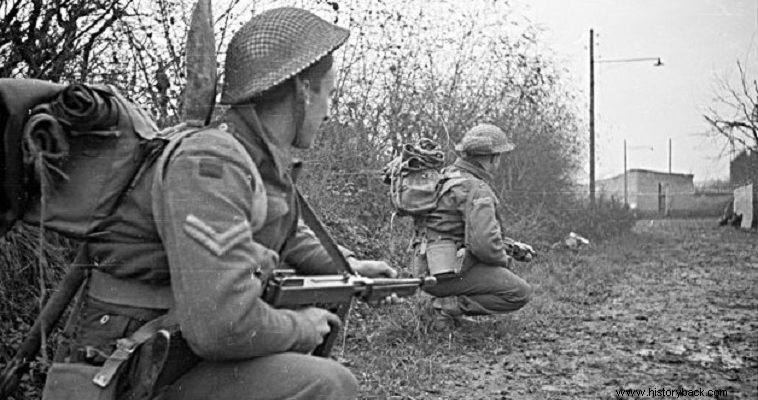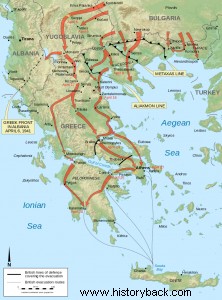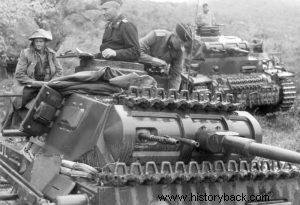
On March 29, 1941 the New Zealand 21st Infantry Battalion (29th NTP) landed in Athens. Its commander was Lt. Col. Mackie. Two of its captains were veterans of the First World War. On April 8, two days after the German attack against Greece, the battalion was sent to Platamonas.
There they encountered Company D of the 26th Infantry Division covering the railroad tunnel there. The tunnel was about 800m away. from the sea. The area was dominated by the old Byzantine castle and hill 266 . Maki was ordered to cover the tunnel, the castle and Hill 266 with his battalion.
The lieutenant colonel deployed Company A to the castle hill, Company B to Hill 266, Company C to the village of Ag. Panteleimon and kept Company D as reserve. The New Zealanders laid a few anti-tank mines at specific points as well as some anti-tank ditches.
The battalion was allocated no anti-tank weapons but only a ulama of field artillery deployed behind its emplacement in direct support. Also the battalion did not have hand grenades. To make up for this shortage, the men made improvised dynamite spools with slow-burners, tied to sticks.
On April 14, Major General Freiberg visited the site and assured Mackie that he needn't worry about enemy tanks. That same afternoon, however, Mackie received reports of the presence of strong motorized German forces in front of him. The New Zealanders then attempted to blow up the tunnel but failed to destroy it completely.
Opposite Lt. Colonel, then and later General, Balk commanded a Battle Group of the 2nd Panzer Division (MPa). The 2nd Army was tasked with overthrowing the enemy resistance in the area and advancing towards Larissa through the Tempe Pass .
Balck had a "Hunter" (motorized infantry) battalion, the staff, the reconnaissance platoon, and the 1st Brigade of the 3rd Tank Regiment, the 38th Tank Hunter Battalion (anti-tank) and a squadron of the 7th Artillery Regiment with 15 guns of 10cm and four of 15cm.
German attack
At dawn on April 15, the Germans attacked the Fighter Battalion with a vanguard. However, his first company that rushed out suffered overwhelming losses from the fire of A and B Companies. After this failure, and having realized that the 21st NTP was holding an extended front, Balk decided to execute a supercanonical maneuver west of Ag. Panteleimon with simultaneous frontal pressure from his tanks and infantry.
The Germans sent a company of infantry to carry out the overshoot and with two companies of infantry and a company of tanks they charged head-on. However, they were pinned down again as the five Pz II tanks they sent to the castle hill came to a standstill on the rough terrain and "broke" their tracks. In Ag. Nevertheless, the Germans began to press. The night, however, stopped the battle.
In the meantime the Germans were reinforced with a company of machine guns. The New Zealand artillery, with only 80 rounds per gun, could not do much. Fortunately for the New Zealanders, due to the close contact with the German units they were spared the fire of the German artillery.
Second attack and retreat
At dawn on April 16, the Germans, covered by mortar and machine gun fire, attacked Ag. Panteleimon. C Company requested permission to withdraw but before it was given the phone line was cut. In the meantime the Germans with the fire support of about 50 tanks pressed B Company hard on Hill 266.
The guns supporting the 21st NTP engaged but their ammunition was running out. Maki contacted the higher echelons reporting the situation. At the same time, the German tanks rushed out, managing to climb to the top of the hill.
After that Mackie ordered a retreat. A Company fell back in order and a platoon of them held off the German infantry long enough for B Company to fall back. D Company did the same. The platoon of Bren Carriers and one of the two 25 pdr guns. they delayed the Germans, giving the battalion time to retreat.
The 21st NTP retreated behind Pinios where it again resisted defense but still could not stop the Germans, who in the meantime were reinforced, for a long time. The 21st NTP again managed to retreat with relative order from the Pinios line, but was decimated during the retreat.
The 21st NTP had undertaken a desperate mission without even possessing the necessary weapons even in small numbers, against the mighty German war machine. And Freiberg's assurance to the unfortunate commander of the 21st NTP not to worry about the German tanks at a time when he did not have a single anti-tank gun available to him, was indulgently laughable.
The duty of the administration, said Napoleon the Great, is to provide its men with weapons at least equal to the enemy's... Unfortunately, Freiberg in this battle did not honor military history.


German Pz III tanks in the wider area of Platamonas. Distinguished New Zealand prisoner.
